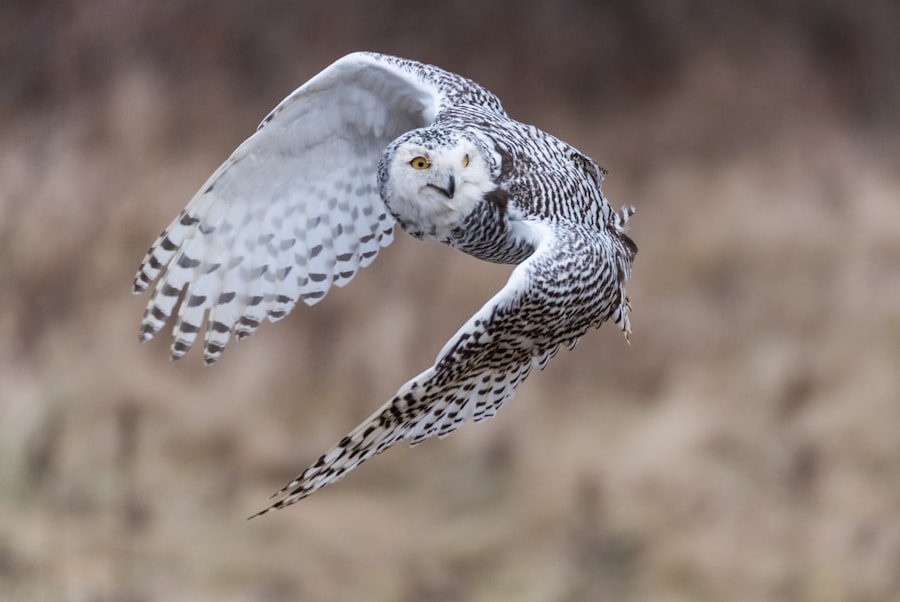Owls are natural predators of chickens and can pose a significant threat to the safety and well-being of your flock. These nocturnal birds of prey have keen eyesight and sharp talons, making them efficient hunters. They are known to swoop down on unsuspecting chickens and carry them away for a meal.
Understanding the threat that owls pose to your chickens is the first step in protecting your flock. By recognizing the behavior and hunting patterns of owls, you can implement effective strategies to keep your chickens safe. Owls are stealthy hunters that rely on their ability to fly silently and surprise their prey.
They are most active at night, making it difficult for chickens to detect their presence. Additionally, owls are known to be opportunistic hunters, meaning they will take advantage of any opportunity to catch their prey. This makes it crucial for chicken owners to be proactive in protecting their flock from owl attacks.
By understanding the threat that owls pose, you can take the necessary steps to create a safe environment for your chickens and deter owls from targeting your flock.
Table of Contents
- 1 Creating a safe environment for chickens
- 2 Using deterrents to keep owls away
- 3 Implementing sound and light strategies
- 4 Utilizing physical barriers
- 5 Seeking professional help
- 6 Monitoring and adapting strategies
- 7 FAQs
- 7.1 What are some natural ways to keep owls away from chickens?
- 7.2 What are some physical barriers that can be used to keep owls away from chickens?
- 7.3 Are there any specific plants or herbs that can help keep owls away from chickens?
- 7.4 What are some signs that an owl may be targeting chickens?
- 7.5 Are there any legal methods for keeping owls away from chickens?
Key Takeaways
- Owls pose a threat to chickens as they are natural predators
- Creating a safe environment for chickens involves securing coops and providing hiding spots
- Deterrents such as scarecrows and reflective tape can help keep owls away
- Sound and light strategies, such as motion-activated lights and radios, can deter owls from approaching
- Physical barriers like netting and fencing can prevent owls from accessing chicken coops
- Seeking professional help from wildlife experts can provide additional guidance on owl deterrence
- Regularly monitoring and adapting strategies is important for long-term owl prevention
Creating a safe environment for chickens
Secure Housing: The First Line of Defense
A sturdy and predator-proof coop will offer protection from owls and other potential threats. Ensure that the coop is well-constructed with strong materials and secure locks to prevent owls from gaining access to your chickens.
Additional Safety Measures
Consider adding a secure run or enclosure to provide extra protection for your flock during the day. Providing adequate lighting around the coop and run is also essential. Owls are less likely to approach well-lit areas, so installing motion-activated lights or keeping the area well-lit during the night can help deter owls from targeting your flock.
Roosting Poles: An Extra Layer of Protection
Furthermore, consider adding roosting poles inside the coop to keep your chickens off the ground at night, reducing the risk of owl attacks. By creating a safe and secure environment for your chickens, you can minimize the risk of owl attacks and ensure the safety of your flock.
Using deterrents to keep owls away

Using deterrents is an effective strategy to keep owls away from your chickens. There are various methods and products available that can help deter owls from targeting your flock. One popular deterrent is the use of visual deterrents such as predator eye balloons or reflective tape.
These items create movement and reflective surfaces that can startle and deter owls from approaching the coop or run. Additionally, installing scarecrows or other large, intimidating objects near the coop can help keep owls at bay. Another effective deterrent is the use of sound devices that emit distress calls or predator sounds.
These devices can create a sense of danger for owls, making them less likely to approach the area. Additionally, consider using ultrasonic devices that emit high-frequency sounds that are unpleasant for owls, deterring them from targeting your chickens. By using a combination of visual and sound deterrents, you can effectively keep owls away from your flock and minimize the risk of attacks.
Implementing sound and light strategies
Implementing sound and light strategies can be an effective way to deter owls from targeting your chickens. As mentioned earlier, owls are less likely to approach well-lit areas, so keeping the coop and run well-lit during the night can help deter them from approaching. Consider installing motion-activated lights or using solar-powered lights to keep the area illuminated during the night.
Additionally, using bright flashing lights or strobe lights can startle and deter owls from approaching the coop or run. In addition to light strategies, implementing sound deterrents can also be effective in keeping owls away from your flock. Consider using sound devices that emit distress calls or predator sounds to create a sense of danger for owls, making them less likely to approach the area.
Furthermore, using ultrasonic devices that emit high-frequency sounds can be unpleasant for owls, deterring them from targeting your chickens. By implementing sound and light strategies, you can effectively deter owls from approaching your flock and minimize the risk of attacks.
Utilizing physical barriers
Utilizing physical barriers is another effective strategy to protect your chickens from owl attacks. One of the most common physical barriers is the use of netting or wire mesh to cover the top of the run or enclosure. This will prevent owls from swooping down and carrying away your chickens.
Additionally, consider adding a roof or cover over the coop to provide extra protection for your flock during the night. By creating physical barriers, you can effectively prevent owls from gaining access to your chickens and ensure their safety. Another physical barrier that can be effective in deterring owls is the use of fencing around the perimeter of the coop and run.
Ensure that the fencing is tall enough to prevent owls from flying over and secure enough to prevent them from gaining access from the ground. Additionally, consider adding an apron or skirt around the perimeter of the coop to prevent digging predators such as foxes or raccoons from gaining access. By utilizing physical barriers, you can effectively protect your chickens from owl attacks and minimize the risk of predation.
Seeking professional help

Expert Guidance and Recommendations
If you’re struggling to protect your chickens from owl attacks, seeking professional help may be necessary. Wildlife experts or pest control professionals can provide valuable insight and assistance in implementing effective strategies to deter owls from targeting your flock. They can assess your property and provide recommendations on how to create a safe environment for your chickens and minimize the risk of owl attacks.
Access to Specialized Deterrents and Products
Additionally, they may have access to specialized deterrents or products that can effectively keep owls away from your flock. Furthermore, seeking professional help can also provide you with valuable information on local regulations and laws regarding wildlife management. In some areas, certain methods of deterring wildlife may be prohibited or require special permits.
Ensuring Legal and Ethical Strategies
By seeking professional help, you can ensure that you are implementing legal and ethical strategies to protect your chickens from owl attacks. Additionally, wildlife experts can provide ongoing support and guidance in monitoring and adapting your strategies to effectively deter owls from targeting your flock.
Monitoring and adapting strategies
Monitoring and adapting your strategies is crucial in effectively deterring owls from targeting your chickens. Regularly inspecting the coop and run for signs of owl activity can help you identify any weaknesses in your defenses and make necessary adjustments. Additionally, monitoring the behavior of your chickens can provide valuable insight into whether your current strategies are effective in deterring owls.
If you notice any signs of stress or fear in your flock, it may be necessary to reassess and adapt your deterrent methods. Furthermore, staying informed about new deterrent products or methods can help you continuously improve your strategies in protecting your chickens from owl attacks. Keep up-to-date with advancements in predator deterrent technology and consider implementing new products or methods that may be more effective in deterring owls.
By monitoring and adapting your strategies, you can effectively protect your flock from owl attacks and ensure their safety and well-being.
If you’re looking for ways to keep owls away from your chickens, you might want to check out this article on PoultryWizard. It offers tips on how to design a secure chicken coop that can help protect your flock from predators like owls. Creating a safe and secure environment for your chickens is essential in keeping them safe from potential threats.
FAQs
What are some natural ways to keep owls away from chickens?
Some natural ways to keep owls away from chickens include using reflective surfaces, such as CDs or mirrors, to create a deterrent, installing motion-activated lights or sprinklers, and using scare tactics like loud noises or predator decoys.
What are some physical barriers that can be used to keep owls away from chickens?
Physical barriers that can be used to keep owls away from chickens include installing netting or wire mesh over the chicken coop, using electric fencing, and ensuring that the coop is secure and free from any openings that owls could enter through.
Are there any specific plants or herbs that can help keep owls away from chickens?
Some plants and herbs that are believed to repel owls include lavender, marigolds, and mint. However, it’s important to note that the effectiveness of these natural deterrents may vary and should be used in conjunction with other methods of owl prevention.
What are some signs that an owl may be targeting chickens?
Signs that an owl may be targeting chickens include finding feathers or remains of chickens near the coop, noticing owl droppings or pellets in the vicinity of the coop, and observing owls lingering around the coop during the day or night.
Are there any legal methods for keeping owls away from chickens?
In many areas, it is illegal to harm or kill owls as they are protected under wildlife conservation laws. Therefore, it is important to use non-lethal and humane methods to keep owls away from chickens, such as those mentioned earlier. If the problem persists, it may be necessary to seek advice from local wildlife authorities.
Meet Walter, the feathered-friend fanatic of Florida! Nestled in the sunshine state, Walter struts through life with his feathered companions, clucking his way to happiness. With a coop that’s fancier than a five-star hotel, he’s the Don Juan of the chicken world. When he’s not teaching his hens to do the cha-cha, you’ll find him in a heated debate with his prized rooster, Sir Clucks-a-Lot. Walter’s poultry passion is no yolk; he’s the sunny-side-up guy you never knew you needed in your flock of friends!







